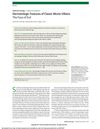
research Acne
4 citations,
January 2019 Acne is a common skin condition that can be influenced by diet, lifestyle, and hormones, and requires a treatment approach that includes psychological considerations.
 September 2024 in “The Italian Journal of Pediatrics/Italian journal of pediatrics”
September 2024 in “The Italian Journal of Pediatrics/Italian journal of pediatrics” COVID-19 vaccination may be linked to MIS-C in children, highlighting the need for quick diagnosis and treatment.
[object Object]  13 citations,
December 2008 in “Veterinary dermatology”
13 citations,
December 2008 in “Veterinary dermatology” A rabbit with sebaceous adenitis was effectively treated with ciclosporin and medium-chain triglycerides.
 73 citations,
July 2016 in “Cosmetics”
73 citations,
July 2016 in “Cosmetics” Mushrooms have beneficial properties for skin and hair care products and have great potential for future cosmetic use.
21 citations,
August 2017 in “Journal of veterinary internal medicine” Combining amino acid and stem cell therapy may help manage hepatocutaneous syndrome in dogs.
 1 citations,
August 2020 in “Food Research”
1 citations,
August 2020 in “Food Research” Plant extracts like Avicennia marina, Boehmeria nipononivea, and Camellia sinensis could potentially treat hair loss with fewer side effects than synthetic drugs.
 48 citations,
May 1991 in “The journal of investigative dermatology/Journal of investigative dermatology”
48 citations,
May 1991 in “The journal of investigative dermatology/Journal of investigative dermatology” Trichohyalin is also found in the outer layers of normal human skin.

Losing weight and eating better are key to managing metabolic syndrome and its related conditions.
24 citations,
December 2018 in “Inflammation and Regeneration” Phospholipase A2 enzymes play key roles in skin health and disease.
 29 citations,
January 2016 in “Annals of dermatology/Annals of Dermatology”
29 citations,
January 2016 in “Annals of dermatology/Annals of Dermatology” Arachidonic acid helps hair grow by increasing growth factors and improving follicle health.
 3 citations,
January 2005 in “Media Asia”
3 citations,
January 2005 in “Media Asia” Advertising in China shifted towards entertainment, favored local brands, and played a significant role in the country's move to a consumer economy.
 64 citations,
May 2019 in “Materials Science and Engineering: C”
64 citations,
May 2019 in “Materials Science and Engineering: C” Microneedle technology has improved drug delivery and patient comfort but needs more research for broader use.
12 citations,
June 2023 in “International Journal of Molecular Sciences” Innovative biomaterials show promise in healing chronic diabetic foot ulcers.
 41 citations,
April 2017 in “JAMA Dermatology”
41 citations,
April 2017 in “JAMA Dermatology” Most classic movie villains have skin conditions, unlike the heroes, which may cause bias against real people with similar conditions.
January 2025 in “Molecules” Caffeine may help with hair loss, but more research is needed to confirm its effectiveness.
 February 2024 in “Clinical, Cosmetic and Investigational Dermatology”
February 2024 in “Clinical, Cosmetic and Investigational Dermatology” Certain fats in the blood are linked to an increased risk of male pattern baldness.
21 citations,
March 2018 in “American Journal Of Pathology” Mutations in NIPAL4 cause skin issues by disrupting lipid layers, but some improvement is seen with topical treatment.
17 citations,
March 1992 in “PubMed”  59 citations,
February 2021 in “BMJ”
59 citations,
February 2021 in “BMJ” High doses of cyproterone acetate increase the risk of brain tumors in women, but the risk decreases after stopping the medication.
 336 citations,
August 2015 in “European Journal of Epidemiology”
336 citations,
August 2015 in “European Journal of Epidemiology” The Rotterdam Study found risk factors for elderly diseases, links between lifestyle and genetics with health conditions, and aimed to explore new areas like DNA methylation and sensory input effects on brain function.
 1 citations,
May 2023 in “Frontiers in endocrinology”
1 citations,
May 2023 in “Frontiers in endocrinology” A new MBTPS2 gene variant disrupts fat metabolism and collagen production, causing Osteogenesis imperfecta.
35 citations,
January 2011 in “Journal of Biological Chemistry” sPLA2-X is crucial for normal hair growth and follicle health.
 10 citations,
July 2019 in “Journal of Asia-Pacific Entomology”
10 citations,
July 2019 in “Journal of Asia-Pacific Entomology” Different silkworm varieties have varying nutrient levels in their powders, which may promote hair growth.
 January 2025 in “Cellular & Molecular Biology Letters”
January 2025 in “Cellular & Molecular Biology Letters” Eicosanoids are crucial for skin health, and targeting their pathways may help treat skin conditions.
72 citations,
March 2013 in “Primates” More research is needed to understand how diet affects isotope signatures in Japanese macaque tissues.
 1 citations,
January 1996 in “Springer eBooks”
1 citations,
January 1996 in “Springer eBooks” Diet affects baldness; eat balanced, less animal fat, more fruits, vegetables, and cereals.
11 citations,
January 2014 in “Mass spectrometry” Silver oxide nanoparticles help detect small molecules effectively.
26 citations,
May 2016 in “Journal of biological chemistry/The Journal of biological chemistry” sPLA2-IIE is crucial for normal hair follicle structure and skin health.
[object Object]  2 citations,
May 2023 in “bioRxiv (Cold Spring Harbor Laboratory)”
2 citations,
May 2023 in “bioRxiv (Cold Spring Harbor Laboratory)” Stem cells help remove dead cells to keep tissues healthy by balancing cell replacement and clearance.
 24 citations,
November 2018 in “International Journal of Molecular Sciences”
24 citations,
November 2018 in “International Journal of Molecular Sciences” Ethosomes improve drug delivery through the skin but may have side effects like irritation.




















